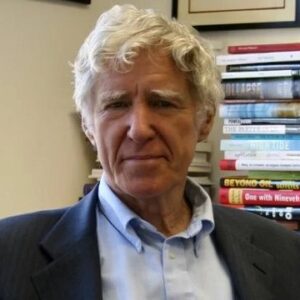Lester Russell Brown is a notable American environmental thinker and analyst who created the non-profit Earth Policy Institute in Washington. Lester grew up on a farm where there was no running water or power. He was an ardent reader and a farmer who encouraged his brother to start a tomato business, which grew to become one of New Jersey’s largest. Rutgers University awarded him a bachelor’s degree in agricultural science. He became aware of concerns like the intimate relationship between food and population during his six-month stay in rural India as part of the International Farm Youth Exchange Program. Lester realized he’d need the support of FAS, or Foreign Agricultural Service, to do anything major. He decided to pursue an agricultural economics degree and joined the Asia branch of FAS. Soon after, he got a master’s degree in public administration, and four years later, he wrote Man, Land, and Food, a revolutionary work. Lester’s study caught the attention of Secretary of Agriculture Orville Freeman, who requested him to find a solution to the situation. Brown has stressed the geopolitical implications of rising grain prices throughout his career. His main focus has been the severe food shortages in developing countries.
Childhood and Adolescence
Brown was born in Bridgetown, New Jersey, on March 28, 1934. He experienced World War II during his childhood and would borrow old newspapers to learn about it.
He was an avid reader who devoured everything, including biographies of great people. Both of his parents were farmers, and he was the family’s first college graduate.
He worked on the farm in his early years, and as a natural entrepreneur, he encouraged his younger brother Carl to start new companies. Their tomato business grew to be one of the largest in New Jersey by 1951.
He studied agricultural science at ‘Rutgers University and graduated in 1955 with a bachelor’s degree. He spent six months in rural India as part of the ‘International Farm Youth Exchange Program’ later that year, where he first experienced the dilemma of population and food.
He wanted to work for the United States Department of Agriculture’s ‘Foreign Agricultural Services,’ but he needed an agricultural economics degree. He completed his studies at the ‘University of Maryland’ in just nine months.
Lester Brown’s Career
Brown began working with FAS in the Asia branch as an international agricultural analyst in 1959. He took a nine-month sabbatical a year later to pursue a Master’s degree in Public Administration from the ‘Harvard Graduate School of Public Administration.’
His most famous work, ‘Man, Land, and Food,’ was released in 1963. Until the turn of the century, it was the most thorough assessment of population, land resources, and food.
The article was picked up by Orville Freeman, then-Secretary of Agriculture, who invited him to join his staff and encouraged him to find a solution to the problem he had helped bring to light.
As a resident specialist on global issues during his term, he advised the department on a variety of subjects, including agricultural policies to be implemented in other countries.
Brown resigned from the government in 1960 and founded the Overseas Development Council.
Brown was the chairman of the ‘International Agricultural Development Service’ from 1966 to 1969, with the main goal of increasing food production in underdeveloped countries.
With a gift from the ‘Rockefeller Brothers Fund,’ Brown launched the ‘Worldwatch Institute’ in 1974. This institute’s only aim was to investigate environmental issues that affected people all around the world.
His personal papers were requested by the Library of Congress in 1986 when it was noticed that his publications have influenced global thinking on population and food.
He wrote ‘Who Will Feed China?’ in 1995, voicing worries about the impact of increased grain imports by developing countries like China on global food costs.
He left the organization in 2001 and created the ‘Earth Policy Institute,’ with the goal of developing plans to save the earth and civilization.
Brown’s autobiography, ‘Breaking New Ground,’ was published at the age of 79, and according to him, it is not simply a memoir, but also a method of reflecting on some of the concepts and views that have defined his life.
He stepped resigned from his position as director of the ‘Earth Policy Institute’ in 2015 at the age of 81.
Brown has co-authored a number of books on environmental issues and food scarcity. He launched the ‘Earth Policy Institute’ in his role as a pioneering environmentalist, with the purpose of supporting a sustainable environment.
Achievements & Awards
Brown was awarded the Humanist of the Year Award by the American Humanist Association in 1991. He was awarded the ‘Delphi International Cooperation Award’ in the same year.
The Association of American Geographers awarded him the Certificate of Special Recognition in 1993. He was awarded the ‘J. Sterling Morton Arbor Day’s honor the following year.
He was inducted into Kyoto’s prestigious ‘Earth Hall of Fame’ in 2010.
Estimated Net worth
Lester is one of the wealthiest environmentalists and one of the most well-known environmentalists. Lester R. Brown’s net worth is estimated to be $5 million, according to Wikipedia, Forbes, and Business Insider.


